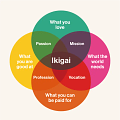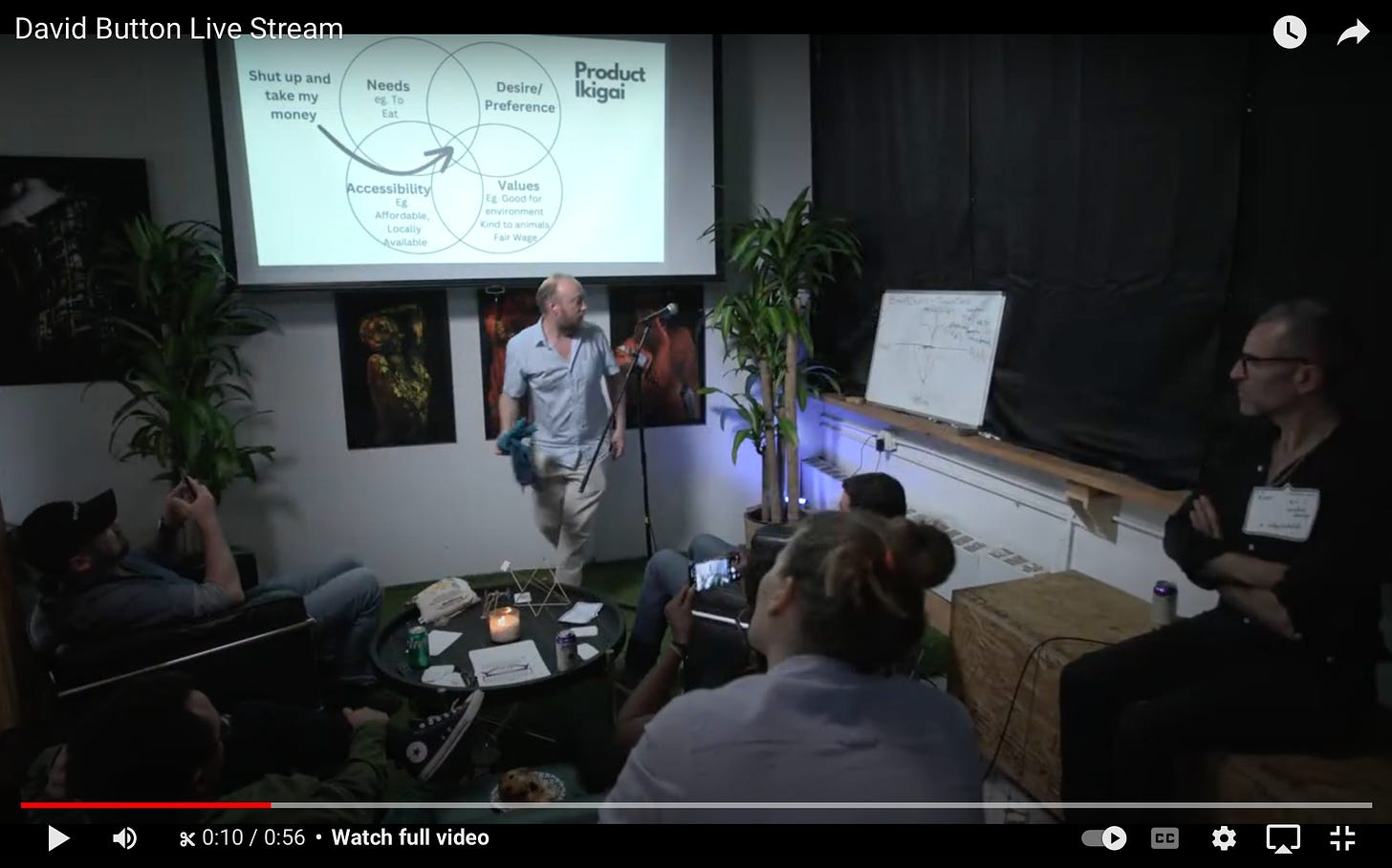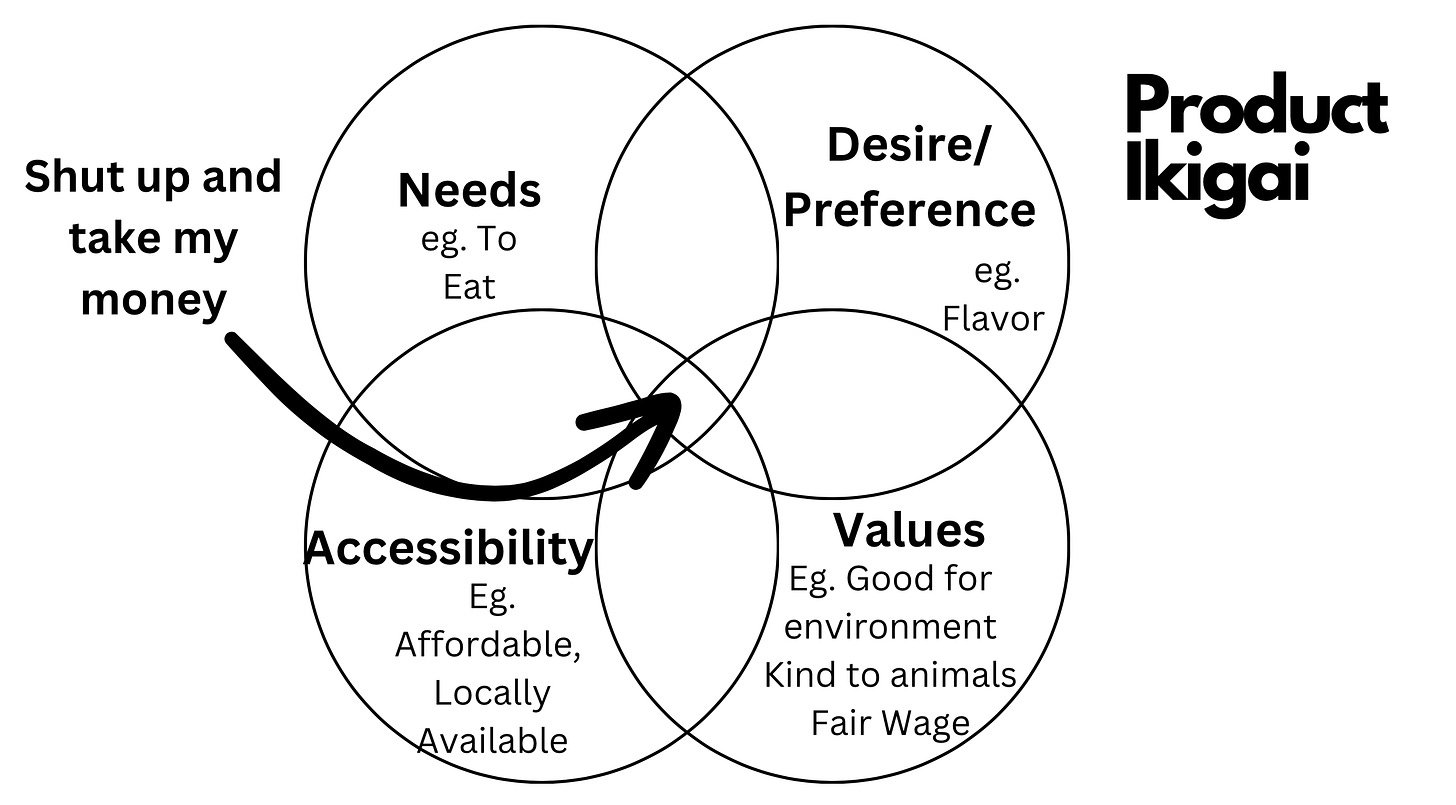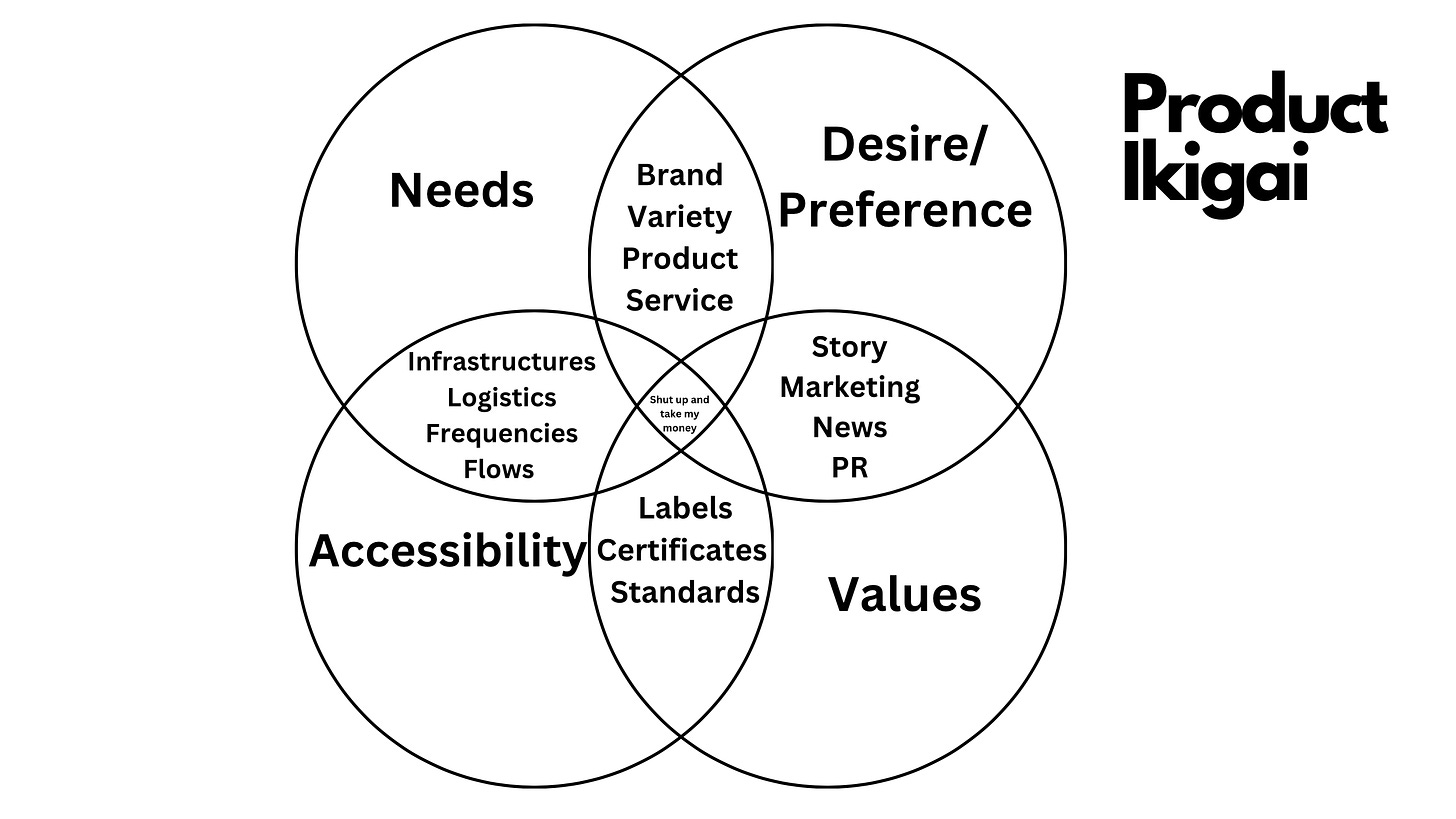I shared this idea at climate week, recently in a workshop at Fablab Egypt, and also with someone I met in a cafe. It appears to offer potential as a framework for thinking about products, services, and business models - highlighting gaps and opportunities in commercial development especially around the topic of Values and how Values are served/met.
It is an evolutionary branch of the Japanese Concept of Ikigai, which is intended to help you find your reason to live. It’s an interesting framework, although I myself am still working out the “what people will pay me for element” in an ideal world there would be 100% overlap between what the world needs and what you can get paid to do. To do that I must develop a process to propagate my evolving design philosophy. Product Ikigai (and perhaps Service/Business Ikigai) is a step towards this.
A summary of the standard Ikigai can be found here.
The Product Ikigai, takes this concept and applies it to products. Ideally this should be done at a products inception - to ask clearly WHETHER A PRODUCT SHOULD EXIST AT ALL. Does it meet a need (or only desire), does it inhibit a need being met? But can also be used later to drive a products evolution within the marketplace.
I introduce the concept here at New York Climate Week, at Impact Oasis.
The Product Ikigai represents the sweet spot and the desired end state of a product entering the marketplace. It is an attempt to add a clear North Star for product development, allowing Value and and Ethics to take place at the early stages of a product, or service design. When encountered in the market place the response is Shut Up and Take My Money!
Note: Whilst this is the desired end state of a product or service it may not be so during the initial stages of the business. We should consider this and use the Product Ikigai as a means to facilitate conversations with customers and potential customers to allow them to coevolve in the direction of the desired end state.
This is essential if we are to move beyond Good/Evil Moral dichotomies with respect to the creation and production of goods. The desire for Good/Evil binary thinking in consumer behaviour is a moral hazard, as it creates states that are hard to attain and incentivises deceitful behaviours.
Take for example Organic Produce - Switching produce to organic carries a high cost (and potential risk - as shown in Sri Lanka), this shift requires time, effort, and documentation. Yet there is consumer demand due to a change in Values (for some the environment, for others health, for others both). Businesses in their inception may not be able to offer products at accessible price point, or even fulfill the criteria needed.
The potential for a business to enter into a clear dialogue with customers about it’s direction AND it’s progress along that path, allows for a mature relationship that increases trust. The alternative at present is all to frequently greenwashing, propaganda and manipulation, which inevitably gets discovered and leads to further erosion of trust across the market. Both the consumer and producer need to engage in honest reflection about the realities of our situation if we are to share the responsibility of moving in a moral direction.
Supporting Genocide is a red line for me both politically and as a consumer, yet I still have to find ways to extract myself from existing dependancies (eg. Google, Facebook, Whatsapp et al). Most of my communications stack being owned by technological enablers of genocidal behaviours. Even here a path is required, preferably walking together with the tech companies away from such relationships, as as communities consciously seeking alternatives (as one cannot simply adopt a new tech stack alone).
*Flashback to an airport shop attempting Product Ikigai for the ethically blinded - Chocolates for Trump next to Chocolates for Harris sold by the same company.*
I’m still not sure where and how best to use the Product Ikigai, perhaps as a personal tool to begin, secondly as a design/business tool to create better design briefs, but I suspect it’s greatest potential is as a conversational asset to allow for communities of consumers and providers to discuss and better define what their ideal products and services might look like. Then to allow for a regular review of how close to those targets the company is getting (eg. 60% organic).
Perhaps ultimately an App that guides both consumers and businesses towards products that get closer and closer to meeting their needs, values, desires/preferences in ever more accessible (easy to buy, cheap, locally available) ways.
Shifting towards % of values creates interesting market opportunities, and an ethical provocation. For example in an ideal world I might VALUE products which are 100% fair trade, Zero waste, Organic, Cruelty Free etc. however within the context of my personal Product Ikigai I cannot afford such goods. If I could buy 50% fair, 50% less waste, 50% Organic etc. isn’t this still better than 100% evil? Where Values conflict with Need we need to be able to move together, to shift the system rather than create private “holier than though'“ exclusive bubbles of ethical access.
Anne-Kajser Liddell’s 50% Bean 50% Beef burger business is an example of this type of practice. If we move the behaviour of more people by making it easier, then the collective ethical impact is far greater than a privileged few ascetics who are able to afford to make the shift.
The shift to addressing ethics as a path to progress along also allows for the potential for others to accelerate and assist others in order that we all progress further and fasted together.
Imagine for example a range of products where you have 25% Fair Trade, 50% Fair Trade, 100% Fair Trade and 200% Fair Trade (with possibility to go higher). Compare this with a Unfair/Fair Dichotomy. The model we are in of Good/Bad, with access to Ethical Values led purchases being gate kept by earnings, prevents the impoverished from meeting their values (in turn leading to judgement and resentment from more privileged classes who are able to express their values in the market place).
The alternative model allows for expression of Values within ones means. A recognition that both Consumer and Business are on a shared path towards an understood ethical goal, but neither may yet have the means to do so (yet in the case of a business it may still be able to meet the 100% goal in some instances through investment in existing businesses that have already achieved the goal). Additionally it allows for the creation of clear market signals, buy those who would otherwise be denied market access - ie. if someone buys 25% fair trade it is not because they only believe in 25% fair trade, but this is the closest they can afford to satisfy their own Values.
Exceeding 100% would allow for the wealthier still to enable others to access the same ethical standards, subsidising purchases to lower the overall value of 100% Fair Trade products, investing in increasing scale, accessibility and infrastructures.
We can only transform our systems together, individual transcendence does not move the culture far enough or fast enough. Collectively working together towards shared values
Deepening the Model
The above idea comes from exploring where Accessibility and Values overlap. Whilst it does relate to the product, it also requires innovation at the business model level. When I was discussing this with Nabil Yasien Mohamed (who I met serendipitously in a coffee shop), he immediately understood how it could apply this to his business to address the challenges he himself faced as an entrepreneur wanting to be ethical, and yet also needing to sell at an accessible price point. What are the other overlapping considerations, and how do they provoke us to think more clearly about ethical businesses.
I have some further ideas here, but it’s late and this lens is still in it’s infancy. What does it bring up for you? How would you use it to create better services, business models and products? What would you put in the Values Circle?
How many Ikigai Products could you name?
This I believe is the greatest Value of this lens.
In highlighting the opportunities all around. We ignore our Values at our peril. The world needs to be able to take conscious incremental steps towards the kinder reality we know is possible.
Note: I don’t apply this incremental thinking to our political system - context matters. For approaches to escape that issue click here.






